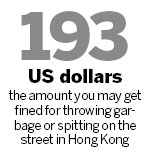
Litterbugs in Shenzhen may be forced to perform community service, with the city drafting a local law in a bid to improve public behavior.
The draft regulation completed its first round of public opinion polling in early July and is now on its second poll.
A questionnaire on the website of the Shenzhen Legislative Affairs Office has 15 questions, with suggested punishments for bad public behavior including community service, restricting the roles able to be held in public office and forcing the offender to make a public apology.
The survey suggests a number of places community service could be carried out, including in hospitals, at charities and at educational institutes. Offenders could also be restricted from working as civil servants, lawyers, teachers, in high management at financial companies, and will have a mark against their names for any application for a Shenzhen permanent residential permit.

Dai Guangyu, deputy head of the committee for education, science, culture and public health of Shenzhen People's Congress Standing Committee, said on Monday the community service idea was adopted from Singapore. He said community service can educate people and have a positive influence on them. He said it is not yet decided what sort of bad behavior will be covered by the regulation because there will be three rounds of opinion polls before the draft is completed.
The first opinion poll surveyed 81,000 people and the committee released the results on July 17. The 10 most common examples of bad behavior included setting up street stalls, spitting and throwing garbage on the street and queue jumping. The 10 most controversial behaviors included raising dogs without registration, bringing dogs into parks, gyms and other public places and smoking in public. The 10 behaviors the citizens believe most needed to be punished included throwing things from cars and buildings, damaging gully covers and traffic signs and starting fires near buildings or in forests.
Many residents applauded the legislation but have concerns about its implementation.
Wang Ming, an employee at an export and import company, said he welcomed the new measures but was concerned about how the laws will be enforced.
"I hate spitting very much, but I'm afraid if such behaviors get fined the urban management officers will have too much power, and I'm afraid the power will be misused," he said.
Zhao Yuming, an assistant lawyer in Shenzhen, shares Wang's concerns.
"I think it's a good plan, but it will be very hard to carry out it in practice ... it's hard to supervise whether it's enforced by the police station or by neighborhood committees because Shenzhen is a city with so many people from all over the country," he said.
Man Kam-chuen, a Hong Kong resident living in Shenzhen, said the city should fine people for bad public behavior.
"In Hong Kong if you throw garbage or spit on the street, and get caught by officers from the Food and Environmental Hygiene Department, you get fined HK$1,500 ($193). It's very strict, people do not dare to throw stuff any more. I think if Shenzhen introduces fines this city will become as clean as Hong Kong," he said.
Zhang Linchang, an IT engineer, also thinks fines will have a positive effect, but he is against implementing a fine system straight away.
"If the government decided to fine people it needs to make it public, on TV, in newspapers and in other publicity channels for a relatively long time until all the residents are informed before the fine is implemented," Zhang said.
"Don't just start fining people all of a sudden and we don't know what's going on. I think fining also needs to be on a sliding scale, a person could be fined 100 yuan when caught the first time and 300 yuan the second or third time," he said.







